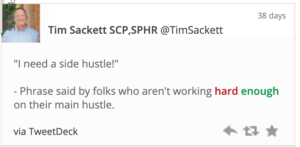I got killed a few weeks ago by some trolls on Twitter over posting this tweet:
I get that many people need to work side hustles to make ends meet in today’s world. I wasn’t talking about these folks working their butts off to make ends meet. I myself work side hustles.
In today’s #outrage culture, this tweet was seen as insensitive by some folks who spend way too much time on Twitter and not enough time on their professional role! Also, I’m clearly not Gary Vaynerchuk, the king of hustle porn, who could tweet this exact tweet and get 5 million likes before the end of the day!
Turns out, Recruiters are now encouraging college students to put their side hustles on their resume and profiles. Why? Because employers actually really like candidates who aren’t afraid to work! It’s the #1 thing that executives tell me when we talk about their pain points around hiring. “Tim, we just need people who want to work!”
So, what are the top side hustles you should be adding onto your resume and profiles? The folks at The Knowledge Academy did a survey and found these were the most popular:
- 85% of US recruiters recommend those college students who buy items from garage sales and then sell them online for a higher price, to include it on their resume/job applications
- 67% of US recruiters believe college students that create/modify products to sell online, should have it on their resume/job applications
- 60% of US recruiters think college students who offer photography services for hire, encourage stating it on their resume/job applications
I really think as a candidate, any skill you believe adds to your overall value as an employee should be something you add to your resume and/or profile, but just know that some HR/Talent/Hiring Managers will look at this in different ways. If you’re an engineer and you’re also driving for a ride share service, you probably need to explain why the full-time gig isn’t enough. “I’m also supplementing my income with weekend and evening ride share to help pay off my student loans quicker!”
The survey found that –52% of recruiters feel companies who know an employee has a growing ‘side hustle’ should take an active approach to support them (i.e. offering flexible working hours). Um, what!? So, Mary is our accountant and we love her, but she also has a growing cupcake business on the side and I should give her time off to go do that and not fulfill her duties in a full-time role? I’m not sure I 100% can buy into this philosophy from a business standpoint!
I would probably go back to that employee and ask them if they started their own business, like this side hustle, and had to hire folks, who then wanted to not work their ‘real’ job, but put more time and effort towards their own thing, how would that sit with them? I already know the answer. They want and need workers who are committed and get their jobs done like everyone else.
It’s definitely a different world we live in. Side hustles become full-time hustles for so many folks. I definitely see this when someone is working a full-time gig that they hate, and a side hustle that they love. Like Gary V would say, you need to then adjust your lifestyle to fit your side hustle, and not your full-time gig if that’s what you desire to do. What you can’t do is think just because you love petting puppies, doesn’t mean you can do it full-time without giving up some stuff. It’s hard to make those Tesla payments on a puppy petter salary!

